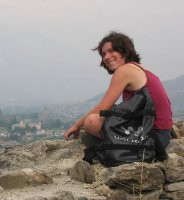Terrestrial Biodiversity
Climate Change
Trees, Forests & Deforestation
Climate Adaptation & Resilience
Ecosystem Services
Post-Doctoral Fellowships
France
2009.01.07
Tree Range evolution under Climate change
HOW TO SURVIVE: FIGHT AND/OR FLIGHT
Biography
Since my master at Ecole Normale Supérieure de Lyon (France), I have worked in the area of evolutionary ecology at the Centre of Functional and Evolutionary Ecology in Montpellier (France). I am interested in the processes of creation and maintaining of biological diversity, notably when humans play a strong role in the story.
During my dissertation, I studied how ecological diversity could emerge, using the plant genus Manihot as an example. This genus diversified into a hundred species, one of which is cultivated cassava, within a few million years. More specifically, I addressed how the domestication of cassava modified the ecological strategy of seed germination.
I was also interested in intraspecific genetic diversity, and studied the geographic origin of cultivated cassava, the history of the migrations of the wild ancestor of the crop, and I showed how Amerindian cassava farmers created and maintained genetic diversity within their crop.
Research work
During my post-doctoral fellowship, my concerns will also be related to the influence of humans on biodiversity, albeit in a more contemporary frame.
Ongoing global changes have a strong impact on species' ecological characters. Notably, climate warming modifies species' phenology (that is, the timing of biological events) and displaces their spatial distribution, with a latitudinal shift towards the poles. Several types of ecological models have aimed at understanding and predicting these shifts ; however, none of them takes into account the species' evolutionary potential.
In a collaboration between the research teams of Isabelle Chuine (Centre of Functional and Evolotionary Ecology, Montpellier, France) and Mark Kirkpatrick (Section of Integrative Biology, University of Texas at Austin, USA), I will integrate this component into an existing ecological model, and try to predict how a tree species (Quercus robur, pedunculate oak) can displace its range in the next two centuries. This model will be applicable to other taxa as well, provided sufficient information on their biology and plasticity is known.
AXA funding
I most appreciated the freedom I had to design my project. One of the most interesting features of the Axa Research fund fellowship is the inclusion of specific funding for attending conferences and workshops.
To add or modify information on this page, please contact us at the following address: community.research@axa.com

Anne
DUPUTIÉ
Institution
Centre National de la Recherche Scientifique
Centre d'Ecologie Fonctionnelle et Evolutive
Country
France
Nationality
French
Related articles
Sustainable Living & City
Climate Change
Climate Adaptation & Resilience
Urban Planning
Resilient Infrastructure & Safety
Environmental Justice
Post-Doctoral Fellowship
Australia
2023.06.20
Indicators for Climate Resilient City Planning
Expected start date:June-2023 Cities contribute enormously to global greenhouse emissions and are key drivers of climate change. By the same... Read more

Melanie
LOWE

